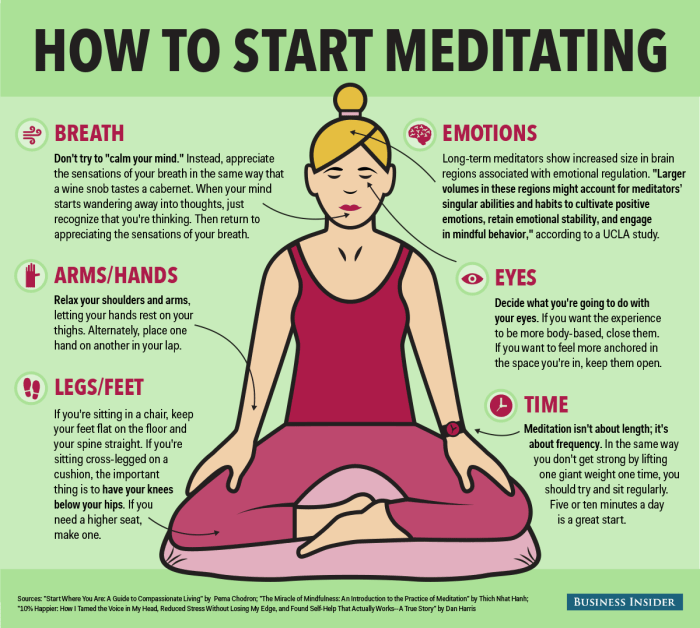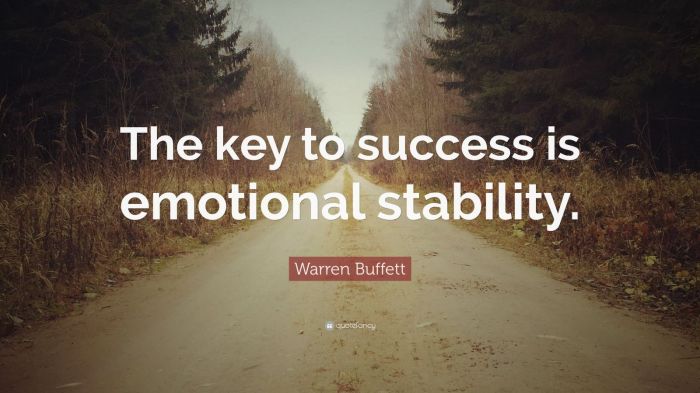How to Meditate for Building a Foundation of Emotional Stability sets the stage for this enthralling narrative, offering readers a glimpse into a story that is rich in detail and brimming with originality from the outset. The exploration of meditation techniques for emotional stability is both enlightening and practical, making it a must-read for those seeking inner balance and well-being.
Understanding the essence of emotional stability and the transformative power of mindfulness through meditation is key to unlocking a harmonious life. Dive into the world of meditation with this comprehensive guide and embark on a journey towards emotional resilience and peace.
Introduction to Meditation

Meditation is a practice that involves training the mind to focus and redirect thoughts. It has numerous benefits for emotional stability, including reducing stress, anxiety, and negative emotions. By cultivating mindfulness and awareness, meditation can help individuals better understand and manage their emotions.
Constant mental tension and overthinking can weigh heavily on your well-being. Meditation offers a refuge where you can release these burdens and find peace within yourself. Explore techniques and tips on How to Meditate for Releasing Mental Tension and Overthinking to cultivate a calm and clear mind, free from unnecessary worries.
The Benefits of Meditation for Emotional Stability
- Reduces Stress: Meditation promotes relaxation and helps in lowering cortisol levels, the stress hormone.
- Enhances Emotional Regulation: Regular meditation can improve emotional regulation by increasing self-awareness and promoting a sense of calm.
- Boosts Resilience: Building a meditation practice can enhance resilience to emotional challenges and difficult situations.
- Improves Mental Clarity: By quieting the mind, meditation can enhance mental clarity and decision-making abilities.
The Importance of Regular Meditation Practice
- Consistency is Key: Regular meditation practice is essential for reaping the full benefits of emotional stability.
- Builds a Strong Foundation: Like any skill, meditation requires practice to develop and strengthen emotional resilience over time.
- Cultivates Inner Peace: Through consistent meditation, individuals can cultivate a sense of inner peace and emotional balance in their daily lives.
Understanding Emotional Stability
Emotional stability is the ability to maintain a sense of inner calm and peace despite the challenges and stressors of everyday life. It involves having control over your emotions, being able to regulate them effectively, and not letting them dictate your reactions and behaviors.
Significance of Emotional Stability
Emotional stability plays a crucial role in overall mental health and well-being. When you are emotionally stable, you are better equipped to handle stress, navigate difficult situations, and make rational decisions. It allows you to maintain healthy relationships, communicate effectively, and cope with life’s ups and downs more resiliently.
When it comes to healing and recovery, meditation can be a powerful tool. By practicing mindfulness and focusing on your breath, you can tap into your body’s natural ability to heal itself. Check out this guide on How to Meditate for Healing and Recovery to start your journey towards a healthier, more balanced life.
- Emotional Instability Effects on Daily Life
Individuals who struggle with emotional instability may experience mood swings, intense emotional reactions, and difficulty managing their feelings. This can lead to impulsive behavior, conflicts in relationships, and a sense of being overwhelmed by emotions.
- Relationship Between Emotional Stability and Mindfulness
Practicing mindfulness can help enhance emotional stability by increasing self-awareness, promoting emotional regulation, and reducing reactivity to stressors. Mindfulness encourages individuals to observe their thoughts and feelings without judgment, allowing them to respond to situations more mindfully and calmly.
Types of Meditation Techniques: How To Meditate For Building A Foundation Of Emotional Stability

Meditation offers a variety of techniques that can be beneficial for building emotional stability. Each technique has its unique approach to calming the mind and cultivating a sense of inner peace. Let’s explore some of these meditation practices and how they contribute to emotional well-being.
If you struggle with focus and productivity, meditation can help you sharpen your mind and stay on track. Learn how to incorporate meditation techniques into your daily routine to boost your concentration and efficiency. Discover more insights on How to Meditate to Increase Your Focus and Productivity and unlock your full potential.
Mindfulness Meditation
- Mindfulness meditation involves focusing on the present moment without judgment.
- By bringing awareness to your thoughts and feelings, mindfulness meditation helps you observe them without getting caught up in them.
- Practicing mindfulness regularly can reduce stress, anxiety, and enhance emotional regulation.
Loving-Kindness Meditation
- Loving-kindness meditation involves cultivating feelings of love, compassion, and kindness towards oneself and others.
- By directing positive intentions and well-wishes towards yourself and others, this practice can improve empathy, reduce negative emotions, and enhance emotional resilience.
- Guided loving-kindness meditations often involve repeating phrases like “May I be happy, may I be healthy, may I be safe, may I live with ease.”
Body Scan Meditation
- Body scan meditation involves systematically focusing on each part of the body, bringing awareness to any sensations or tensions present.
- By practicing body scan meditation, you can release physical and emotional tension, cultivate body awareness, and promote relaxation.
- Body scan meditations are often guided, leading you through each body part from head to toe.
Steps to Meditate for Emotional Stability

Meditation is a powerful tool for cultivating emotional stability and inner peace. By practicing meditation regularly, you can build a strong foundation for managing your emotions effectively and improving your overall well-being.
Create a Conducive Environment
- Find a quiet and comfortable space where you won’t be disturbed.
- Set the mood with soft lighting, calming scents, and relaxing music if desired.
- Sit in a comfortable position with your back straight and your hands resting gently on your lap.
- You may choose to close your eyes or focus on a specific point in front of you.
Consistency is Key
Consistency is crucial when it comes to meditation practice, especially for building emotional stability. Make an effort to meditate at the same time each day to establish a routine that works for you. Over time, you’ll find that regular meditation helps you stay grounded and centered, even in challenging situations.
Incorporating Mindfulness in Meditation

When it comes to building a foundation of emotional stability through meditation, incorporating mindfulness is essential. Mindfulness involves being fully present in the moment, observing your thoughts and feelings without judgment. This practice can significantly enhance your emotional well-being by promoting self-awareness and reducing reactivity to negative emotions.
Techniques to Enhance Mindfulness
Here are some techniques to enhance mindfulness during your meditation sessions:
- Focus on your breath: Concentrate on the sensation of your breath as you inhale and exhale. This helps anchor you in the present moment and cultivate awareness.
- Body scan: Take a few moments to scan your body from head to toe, noticing any areas of tension or discomfort. This practice helps you connect with your physical sensations and promotes relaxation.
- Labeling thoughts: When thoughts arise during meditation, simply label them as “thinking” and gently return your focus to your breath. This technique helps create distance from your thoughts and prevents them from overwhelming you.
- Loving-kindness meditation: Practice sending love and compassion to yourself and others. This cultivates a sense of connection and empathy, fostering emotional resilience.
Practicing Mindfulness for Deeper Benefits
By incorporating mindfulness into your meditation practice, you can deepen the benefits for emotional well-being in the following ways:
- Increased emotional regulation: Mindfulness helps you become more aware of your emotions and how they manifest in your body. This awareness allows you to respond to challenging situations with greater calm and clarity.
- Improved stress management: Mindfulness reduces the impact of stress on your mind and body by helping you stay present and grounded. This can lead to a more balanced and resilient response to stressors.
- Enhanced self-compassion: Mindfulness encourages you to treat yourself with kindness and understanding, fostering a positive relationship with yourself. This practice can boost self-esteem and overall emotional well-being.
- Greater mental clarity: By training your mind to focus on the present moment, mindfulness can enhance your cognitive functions and decision-making abilities. This clarity can help you navigate complex emotions more effectively.
Overcoming Challenges in Meditation

Meditation is a powerful tool for cultivating emotional stability, but it is not without its challenges. These obstacles can hinder our practice and make it difficult to fully experience the benefits of meditation. By recognizing these challenges and implementing strategies to overcome them, we can navigate through the difficulties and deepen our meditation practice.
Distractions during Meditation
One of the most common challenges faced during meditation is dealing with distractions. Whether it’s external noise, intrusive thoughts, or physical discomfort, distractions can pull us away from our focus and disrupt the flow of our practice. To overcome distractions, it’s important to acknowledge them without judgment and gently guide our attention back to the present moment. Practicing mindfulness can help us cultivate awareness of distractions without getting caught up in them.
Restlessness and Impatience
Feeling restless or impatient during meditation is another common challenge that many practitioners encounter. It’s natural for the mind to wander and for impatience to arise, especially when we’re not seeing immediate results. Patience is key in overcoming this challenge, as progress in meditation takes time and consistent practice. By approaching our practice with self-compassion and accepting that restlessness is part of the process, we can cultivate a greater sense of calm and stability.
Self-Judgment and Criticism, How to Meditate for Building a Foundation of Emotional Stability
Self-judgment and self-criticism can be significant obstacles in meditation practice. When we are overly critical of ourselves or expect perfection in our practice, it can create unnecessary stress and hinder our progress. Cultivating self-compassion is essential in overcoming these negative thought patterns. By practicing self-kindness and offering ourselves the same compassion we would to a friend, we can create a more nurturing and supportive environment for our meditation practice.
Embark on your meditation journey armed with the knowledge of building emotional stability through mindfulness and self-awareness. Let the soothing practice of meditation guide you towards a calmer, more centered existence, where emotional balance reigns supreme.